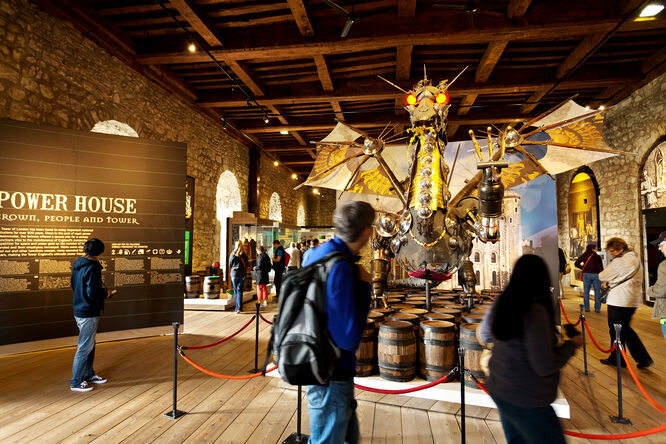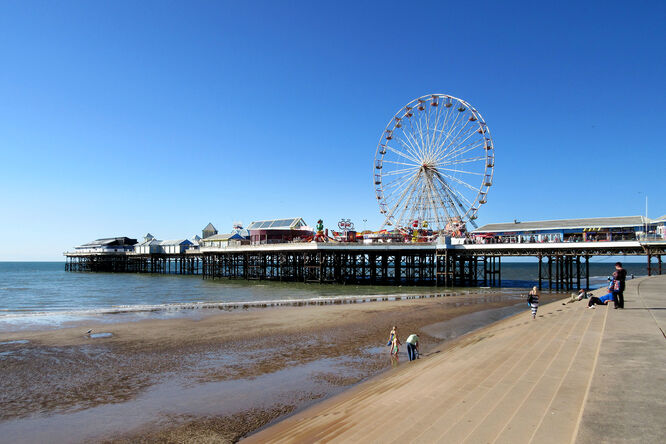In Britain, the Kids Are Alright
By Rick Steves
Imagine being a kid forced to spend a big part of your summer vacation with robo-tourist Rick Steves (alias Dad). My kids Jackie and Andy did that a lot when they were young. I always considered it a great education for them, but they also had a lot of fun. One of their favorite destinations, Great Britain, enthralled them with colorful pageantry and evocative historical sights. Here's what impressed them the most.
In London, the Buckingham Palace Changing of the Guard features stone-faced, red-coated, bearskin-hatted sentries changing posts with much fanfare. Kids are particularly fascinated by the King's Life Guard sentries at Horse Guards, with their colorful dismounting ceremony. At the Tower of London, the Beefeater tour plays off kids in a fun way — mine were captivated by the medieval knight who demonstrated sword fighting tactics, nearly killing his squire. The crown jewels are awesome, and youngsters love the giant dragon made out of old weapons and armor in the Arsenal.
For a little cultural history in the big city, visit Shakespeare's Globe Theatre. First tour the theater to learn about how and why it was built like the original from 1600, then take in a show. My kids loved the "groundling" tickets — we saw the play right up front, with our elbows on the stage. The actors involve the audience…especially the groundlings.
All around Britain, open-air folk museums are fun and enlightening — a magic carpet ride through a culture's past. Durham's 300-acre Beamish Museum, which re-creates life in northeast England during the 1820s, 1900s, and 1940s, is the best museum of its type. It takes at least three hours to explore the various sections: 1900s Pit Village and Colliery (a coal-mining settlement with an actual mine), 1900s Town (a street lined with real shops), 1820s Pockerley (a "gentleman farmer's" manor house, church, and garden), and 1940s Farm. This isn't a wax museum — if you touch the exhibits, they may smack you.
Similarly, in Wales, 100-acre St. Fagans National Museum of History near Cardiff models traditional Welsh folk life with carefully reconstructed and fully furnished historic buildings, as well as a "castle" (actually a Tudor-era manor house) that offers a glimpse of how the other half lived. Its workshops feature busy craftsmen eager to demonstrate their skills, and each house comes equipped with a local expert warming up beside a toasty fire. Kids can ask questions — and they should: Everyone here is happy to tell you anything you want to know about how Welsh life was lived when these buildings were new.

Castles are another slice of history popular with the younger set. Just north of Stratford-Upon-Avon, you'll find England's single most spectacular castle: Warwick. This medieval masterpiece, which has been turned into a virtual theme park, is extremely touristy — but it's also historic and fun, and may well be Britain's most kid-friendly experience. It's a fairy-tale fortress that's entertaining from dungeon to lookout. Kids love the costumed docents who perform fantastic demonstrations of medieval weapons.
Edinburgh Castle is another a fascinating and multifaceted sight where you can walk the ramparts, see old-time military gear, and ogle the stunning crown jewels of Scotland. There's also plenty of ghostly history in Scotland's capital city. A variety of companies lead spooky walks around town, providing an entertaining and affordable night out for the whole family. Or, for an unusual peek at Edinburgh's gritty, plague-ridden past, join a costumed performer on The Real Mary King's Close, an hour-long trip through an excavated underground street near the Royal Mile. Tours include a goofy, crowd-pleasing ghost story or two, but focus on authentic and historical insight into a part of town entombed by later construction.
The unique nature and wildlife of the British Isles is also an important source of tradition. My kids' favorite outdoors experience was guided horseback riding through the Cotswolds, as Brits have been doing for centuries. They also enjoyed taking tractor rides at the Cotswold Farm Park, which houses endangered breeds of native British animals. The Cotswold Falconry Centre has dozens of eagles, falcons, owls, and other birds, and a hair-raising demonstration, with birds of prey swooping inches over your head.
To show the kids a lesser-known side of Britain's past, visit a crusty seaside resort such as Brighton or Blackpool — both of them resort towns that grew up with the Industrial Revolution. In the mid-1800s, entire mill towns would close down and take a two-week break to stroll beachside promenades in resorts like these. Both Brighton and Blackpool have a year-round carnival atmosphere with rides, garish arcade games, tacky souvenirs, and faces made sticky with "toffee" (caramel) apples and "candy floss" (cotton candy). Blackpool's Pleasure Beach amusement park also boasts some of Britain's best white-knuckle roller coasters. Brighton and Blackpool are as English as the King — and considerably more fun.
With so much history and tradition to uncover, taking your kids to Britain is an unforgettable family vacation. Your kids get to take home a great souvenir — a better grasp of the richness of history and a deeper understanding of the vastness of our world. And, in my book, that's good parenting.

